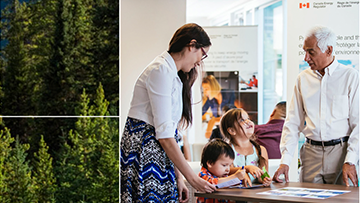Reconciliation
We are committed to the ongoing process of Reconciliation, building a new relationship with Indigenous Peoples based on recognition of rights, respect, cooperation and partnership. Transforming how we work with Indigenous Peoples and incorporating Indigenous knowledge into our work will help us improve safety and environmental outcomes.
We recognize that reconciliation with Indigenous Peoples is an ongoing journey. Our work is guided by the United Nations Declaration on the Rights of Indigenous Peoples (UNDRIP), the Calls To Action of the Truth and Reconciliation Commission, and the Principles respecting the Government of Canada’s relationship with Indigenous Peoples.
In 2020–21, our strategy is based on a firm belief that in order to work differently with Indigenous communities, we must deepen our understanding. A shared cultural awareness is key to establishing strong and trusting relationships, and it is only through these relationships that we can co-develop approaches that work for everyone.
We are improving our Indigenous cultural competency by training employees to understand more about Indigenous history, culture and contemporary issues facing Indigenous Peoples in Canada.
We invite Indigenous communities to be more involved, not just in our hearings, but also in our oversight work throughout the life of a pipeline project. New structures like the Indigenous Advisory Committee will root Indigenous perspectives into our overall strategy setting and program development across the CER.
Features
- Date modified:



